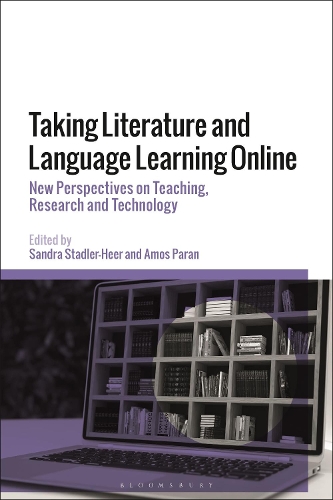
Taking Literature and Language Learning Online: New Perspectives on Teaching, Research and Technology
(Hardback)
Available Formats
Publishing Details
Taking Literature and Language Learning Online: New Perspectives on Teaching, Research and Technology
By (Author) Dr Sandra Stadler-Heer
Edited by Professor Amos Paran
Bloomsbury Publishing PLC
Bloomsbury Academic
17th November 2022
United Kingdom
Classifications
Professional and Scholarly
Non Fiction
Language acquisition
Educational equipment and technology, computer-aided learning (CAL)
418.0071
Physical Properties
Hardback
280
Width 156mm, Height 238mm, Spine 20mm
560g
Description
The use of literary texts in language classrooms is firmly established, but new questions arise with the transfer to remote teaching and learning. How do we teach literature online How do learners react to being taught literature online Will new genres emerge from the COVID-19 pandemic Is the literary canon changing This volume celebrates the vitality of literary and pedagogic responses to the pandemic and presents research into the phenomena observed in this evolving field. One strand of the book discusses literary outputs stimulated by the pandemic as well as past pandemics. Another strand looks at the pedagogy of engaging learners with literature online, examining learners of different ages and of different proficiency levels and different educational backgrounds, including teacher education. Finally, a third strand looks at the affordances of various technologies for teaching online and the way they interact with literature and with language learning. The contributions in this volume take literature teaching online away from static lecturing strategies, present numerous options for online teaching, and provide research-based grounding for the implementation of these pedagogies.
Reviews
This novel, timely and interesting volume explores the nexus of literature and foreign language learning, and more importantly their interconnectedness throughout the move to online publishing and teaching arising from the Covid-19 pandemic. Online interaction is at the heart of the volume, and the role literature and art more broadly have played in reminding learners and teachers alike why life is worth living (Ben Okri, p.1) during the dark days of the pandemic. Yet although the volume is very deeply rooted in 2020 and subsequent years, the messages coming out of it have relevance beyond that period, for both language practitioners and researchers. Rather than just presenting the challenges posed for engagement with literature by online teaching, learning and publishing, the volume invites the reader to consider the many affordances of the digital world. In so doing it will be of interest to all those concerned with language education in the broadest sense, from the early years of schooling through to teacher education and publishing. * Suzanne Graham, Professor of Language and Education, Institute of Education, University of Reading, UK *
The volume provides very interesting insights into a timely topic from a variety of perspectives. Student and practicing teachers will find a wealth of ideas for classroom activities as well as theoretical considerations. * Annika Kolb, Professor, University of Education Freiburg, Germany *
Author Bio
Sandra Stadler-Heer is Senior Lecturer of TESOL at the Department of Linguistics and Literature, Catholic University of Eichsttt-Ingolstadt, Germany. Amos Paran is Professor of TESOL at IOE, UCLs Faculty of Education and Society, University College London, UK.
